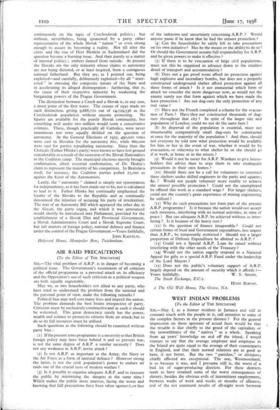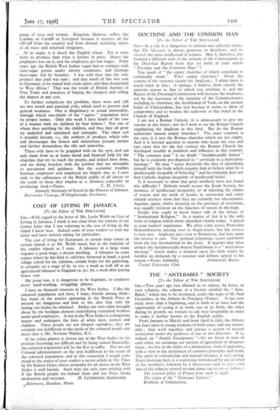WEST INDIAN PROBLEMS [To the Editor of THE SPECTATOR] Sm,—May
I, as a former resident in Jamaica and still in constant touch with the people in it, call attention to some of the complex factors in the present distress ? For the general impression on those ignorant of actual facts would be that the trouble is due chiefly to the greed of the capitalists or the unworthiness of the " natives " as a whole. Speaking from 44 years' knowledge on and off the island, I would venture to say that the average employer and employee in the Island are quite equal to the average of their counterparts in England, and that their normal relations are as good as here, if not better. But the two " parishes," or divisions, chiefly affected are exceptional. The one, Westmoreland, is so because it was, and I presume still is, the worst of a bad lot of sugar-producing districts. For these districts seem to have retained some of the worst consequences of slavery, besides the obvious evils of intermittent employment, between weeks of work and weeks or months of idleness, and of the not unnatural results of all-night work between
gangs of men and women. Kingston, likewise, suffers like London or Cardiff or Liverpool because it receives all the riff-raff from the country and from abroad, including sailors of all races and returned emigrants.
As to sugar, it is much like English wheat. For it costs more to produce than what it fetches in price. Hence the employers lose on it, and the employees get low wages. Forty years ago the British West Indian sugar had to compete with cane-sugar grown under slavery conditions, and German beet-sugar fed by bounties. I was told then that the only product that paid was rum ; and that much of this was sent to Germany, to be mixed with crude spirit, and then despatched to West Africa ! That was the result of British theories of Free Trade and practices of buying the cheapest and selling the dearest at any cost.
To further complicate the problem, there were and still are two moral and practical evils, which tend to poverty and general weakness. One is illegitimacy or sexual immorality, through which two-thirds of the " native " population have no proper homes. Only this week I have heard of the case of a woman with six children by four fathers ! Not one of whom does anything for the children, and thus they all grow up underfed and untrained and untaught. The other evil is praedial larceny, i.e., the robbery of produce, which robs and discourages the honest and industrious peasant farmer and further demoralises the idle and unworthy.
These evils have to be grappled with on the spot, and can only claim from us at home moral and financial help for the churches that try to reach the people, and indeed have done, and are doing wonders with the portion that are amenable to persuasion and guidance. But the economic troubles between employers and employed are largely due, as I nave said, to the callousness of the British public of all classes to the needs of those they employ at a distance, especially in formerly Secretary of Synod in the Diocese of Jamaica. Harrowden Vicarage, Wellingborough, Northants.



















































 Previous page
Previous page